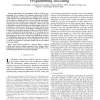Free Online Productivity Tools
i2Speak
i2Symbol
i2OCR
iTex2Img
iWeb2Print
iWeb2Shot
i2Type
iPdf2Split
iPdf2Merge
i2Bopomofo
i2Arabic
i2Style
i2Image
i2PDF
iLatex2Rtf
Sci2ools
103
click to vote
CORR
2007
Springer
2007
Springer
Probabilistic Analysis of Linear Programming Decoding
Abstract—We initiate the probabilistic analysis of linear programming (LP) decoding of low-density parity-check (LDPC) codes. Specifically, we show that for a random LDPC code ensemble, the linear programming decoder of Feldman et al. succeeds in correcting a constant fraction of errors with high probability. The fraction of correctable errors guaranteed by our analysis surpasses previous nonasymptotic results for LDPC codes, and in particular, exceeds the best previous finite-length result on LP decoding by a factor greater than ten. This improvement stems in part from our analysis of probabilistic bit-flipping channels, as opposed to adversarial channels. At the core of our analysis is a novel combinatorial characterization of LP decoding success, based on the notion of a flow on the Tanner graph of the code. An interesting by-product of our analysis is to establish the existence of “probabilistic expansion” in random bipartite graphs, in which one requires only that almost...
Analysis | CORR 2007 | Education | LDPC Codes | Linear Programming |
Related Content
| Added | 13 Dec 2010 |
| Updated | 13 Dec 2010 |
| Type | Journal |
| Year | 2007 |
| Where | CORR |
| Authors | Constantinos Daskalakis, Alexandros G. Dimakis, Richard M. Karp, Martin J. Wainwright |
Comments (0)

